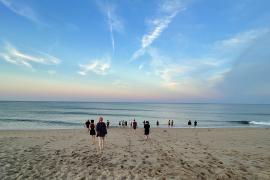Fatigue. We know it when we feel it or see it. It is that feeling that comes after a long period of work, extended periods of stress, or lack of sufficient sleep. Does fatigue emerge at your camp around this time of the summer? Working at a summer camp can create wonderful experiences and joy such as witnessing our campers excel after taking healthy risks or learning new skills. We see counselors’ confidence grow through the summer, as they learn how to adapt and work with various campers and fellow staff members. Research continues to identify the benefits of camp engagement for campers as well as counselors. Lurking in the back is a significant challenge that most camps encounter upon reaching the half way mark of the summer season…fatigue.
The 2006–2010 Healthy Camp Study Impact Report suggested that addressing fatigue was equally as important as providing nutritious meals or ensuring hydration. Camps have investigated and selected menu options to include more fruits, vegetables, and complex carbohydrates. When visiting a camp, it is common to see campers and staff alike carrying their own water bottles, unless they left it at their previous activity. Perhaps nutrition and hydration were immediate issues to address compared to fatigue. After all, many parents like that camp “wears campers out.” Feeling tired after a busy day may help a person sleep at night, but fatigue can pose greater risks to a program. A tired counselor may become a cranky counselor. A tired counselor might make incorrect decisions. A tired counselor could miss an important sign. . . something could go wrong.
Fatigue may arise from an excess of camp’s best features: communal living, constant in-person connectivity, addressing personal needs, outdoor environment, or high level of activity. Fatigue can sneak up on a person when they are in constant motion and not caring for themselves. The signs of fatigue will appear earlier in a person’s behavior or demeanor compared to a resulting injury or illness related to fatigue: becoming short-tempered versus a physical fight. The Healthy Camp Study found injuries occurred with greater frequency in the afternoon, evening, and on overnight trips at resident camps while day camps experienced more injuries in the morning hours. The study could not conclusively state a direct link between fatigue and injuries or illnesses at camp. However, one can imagine that a fatigued brain and body may not operate at peak levels.
Camp can become a stressful experience for staff when the temperatures are high and campers pester staff about their lost nametag (for the fourth time today!), all while staff attempt to create a memorable experience for their campers. Before fatigue becomes a serious problem, here are four suggestions for addressing fatigue at this point in the summer.
1. Consider fatigue as a component of creating a healthy camp environment
A healthy camp environment addresses physical, mental, emotional, and social health. Fatigue can result from inadequate rest or sleep, which impacts a person’s ability to recuperate from long, busy camp days. Many counselors enjoy staying up late with their friends or use the time for activity prep. If the late night hangouts are a challenge then a camp-wide lights out policy might be appropriate. Nutrition and hydration are equally important to addressing fatigue. Watch out for excessive sugary snacks. Eating nutritious meals and hydration throughout the day will provide the fuel counselors and campers needs to navigate a camp day.
2. Identifying and recognizing one’s triggers
Some people are easily irritable while others effortlessly adapt to the nuances of life. Regardless of personality, a situation or behavior may trigger an irritable response even from the most patient person. A person’s triggers may differ at camp compared to other settings like school or home. Triggers could be a screen door slamming for the umpteenth time or simply hearing your name repeatedly called out by the same camper all day. Identifying and recognizing triggers connects to the development of self-awareness: recognizing one’s emotions and the impact on personal behaviors. Perhaps a small segment of the weekly staff meeting could focus on discussing personal triggers and adaptation methods when those situations emerge. Counselors can pair up with an accountability buddy to help them recognize their trigger before an irritable response comes out. In some cases, a frank conversation is necessary when a counselor continually disregards their triggers and responds in an irritable tone to campers and staff alike.
3. Staff appreciation
A counselor’s job may be fun, but there are challenging days. A little appreciation can go a long way. In a research study examining summer camp counselors, the staff’s burnout was attributed to the perception of feeling undervalued, a lack of clear expectations from supervisors, or lack of adequate social support from their co-workers (Bailey, Kang, & Kuiper, 2012). Surprising your staff with a cool treat (i.e., popsicles or ice cream) can brighten their spirits after working outside in the sun all afternoon. Notes of encouragement show staff that you notice their diligent teaching preparations or excellent one-on-one skills with campers having a difficult time. Fatigue may emerge when staff are exerting a lot of energy and not experiencing any reward. Perhaps the activity flopped or rained out. Directors and staff supervisors can show their appreciation by patting that counselor on the back saying, “it happens to the best of us, now go take a 10-minute breather.” The recognition of the effort as well as the need for time to collect oneself can teach staff to adjust and breathe in challenging moments. Millennial staff seek reinforcement and feedback regarding their performance. Extending both appreciation and feedback to staff can help them adjust to the ups and downs of working at a summer camp.
4. Modeling: Do as I say and Do as I do
Campers watch counselors and counselors watch the leadership team. Directors and staff supervisors that are burning the late-night oil and show signs of fatigue the next morning are modeling the wrong behavior. Role modeling is a key component of camp programs. We hire counselors to teach and role model the behaviors we seek from campers. The Leadership Team also teaches and models behaviors sought from the counselors. Counselors may look to the leadership team for guidance. Do the administrators take a break during the day? Does the camp director take a day off (leaving another leadership team member in charge)? We often verbalize the importance of using one’s break time wisely or the benefit of going to bed on time. However, the benefit may be lost if the leadership team does not follow those same practices.
Fatigue can be a significant challenge at this point in the summer, but there are practices that can ease the problem. Supervisors are encouraged to watch for signs of staff fatigue and stress. Staff may display short tempers, exhaustion, or experience declining levels of enthusiasm compared to the onset of summer (Maslach, Jackson, & Leiter, 1996). The triad of a healthy camp should include a focus on nutrition, hydration, and fatigue. Camps should ensure built in rest periods or opportunities for relaxing camp activities intermix with high-energy activities. These scheduled periods enable campers and counselors to rest without feeling as if they are missing out on fun. Dedicated time during staff meetings to discuss fatigue triggers, solutions, and showing appreciation will help staff recognize the collective challenges and joys of working at camp. Lastly, counselors and leadership team members should role model the desired techniques rather than giving directives. Fatigue is a common issue that leadership staff are not immune to experiencing firsthand. Counselors can learn coping mechanisms from leadership staff as much as campers can learn skills from their counselor.
As this final stage of summer progresses, take time to breathe, appreciate each other, and rest. A counselor that is rested and self-aware may be the counselor that others gravitate to for a fun and memorable experience.
Photo courtesy of Camp Woodhaven in West Boylston, MA
Megan Owens, PhD, is an assistant professor in the Department of Recreation, Park and Tourism Administration at Western Illinois University. She is a lifelong camp enthusiast and current member of the Healthy Camp IV committee.
Alli Faricy is a lifelong camp kid who now pretends to be an adult by directing Camp Foley in Northern, Minnesota. In her free time, she takes pictures of wildlife doing wildlife things in their natural habitats. She is a current member of the Healthy Camp IV committee.
The views and opinions expressed by contributors are their own and do not necessarily reflect the views of the American Camp Association or ACA employees.




